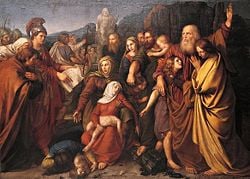Maccabees
- This article is about the Maccabee rebels. For other uses, see Maccabees (disambiguation).
The Maccabees (Hebrew: מכבים or מקבים, Makabim) were Jewish rebels who fought against the rule of Antiochus IV Epiphanes of the Hellenistic Seleucid dynasty, who was succeeded by his infant son Antiochus V Eupator. The Maccabees founded the Hasmonean royal dynasty and established Jewish independence in the Land of Israel for about one hundred years, from 165 B.C.E. to 63 B.C.E. Template:Maccabee
The revolt
In 167 B.C.E., after Antiochus issued decrees in Judea forbidding Jewish religious practice, a rural Jewish priest from Modiin, Mattathias the Hasmonean, sparked the revolt against the Seleucid empire by refusing to worship the Greek gods and slaying the Hellenistic Jew who stepped forward to worship an idol. He and his five sons fled to the wilderness of Judea. After Mattathias' death about one year later, his son Judah Maccabee led an army of Jewish dissidents to victory over the Seleucids. The term Maccabees as used to describe the Judean's army is taken from its actual use as Judah's surname.
The revolt itself involved many individual battles, in which the Maccabean forces gained infamy among the Syrian army for their use of guerrilla tactics. After the victory, the Maccabees entered Jerusalem in triumph and religiously cleansed the Temple, reestablishing traditional Jewish worship there.
Following the re-dedication of the temple, the Maccabees supporters were divided over the question of whether to continue fighting. When the revolt began under the leadership of Mattathias, it was seen as a war for religious freedom to end the oppression of the Seleucids; however, as Maccabees realized how successful they had been many wanted to continue the revolt as a war of national self-determination. This conflict led to the exacerbation of the divide between the Pharisees and Saducees under later Hasmonean monarchs such as Alexander Jannaeus. [1]
Every year Jews celebrate Hanukkah in commemoration of Judah Maccabee's victory over the Seleucids and subsequent miracles.
Mention in Deuterocanon
The story of the Maccabees can be found in the Hebrew Bible in the deuterocanonical books of 1 Maccabees and 2 Maccabees. Books of 3 Maccabees and 4 Maccabees are not directly related to the Maccabees.
Origin of name
The name "Maccabee" is sometimes seen used as synonym for the entire Hasmonean Dynasty, but the Maccabees proper were Judah Maccabee and his four brothers. The name Maccabee was a personal epithet of Judah, and the later generations were not his descendants. Although there is no definitive explanation of what the term means, one suggestion is that the name derives from the Aramaic maqqaba, "the hammer", in recognition of his ferocity in battle. It is also possible that the name Maccabee is an acronym for the Torah verse Mi kamokha ba'elim YHWH, "Who is like unto thee among the mighty, O Lord!" (Exodus 15:11).
See also
- Judas Maccabaeus
- Jonathan Maccabaeus
- Alexander Jannaeus
- Simon Maccabeus
- John Hyrcanus
- Aristobulus
- Salome Alexandra
- Hyrcanus II
- Aristobulus II
